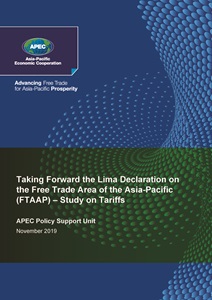Taking Forward the Lima Declaration on the Free Trade Area of the Asia-Pacific (FTAAP) – Study on Tariffs

| Published Date | November 2019 |
|---|---|
| Type of Publication | Reports |
| Publication Under | APEC Secretariat, APEC Policy Support Unit |
| Accessed | 10949 |
| Pages | 70 |
| Download publication | Download |
Description
In 2016, Leaders endorsed the Lima Declaration on the Free Trade Area of the Asia Pacific (FTAAP). As part of the work program on tariffs agreed by the APEC Committee on Trade and Investment (CTI) to implement the Lima Declaration, this study on tariffs was prepared with the intention of:
- Updating the tariff analysis in the Collective Strategic Study on Issues Related to the Realization of the FTAAP.
- Conducting a literature review on previous studies analyzing the potential impact of lowering tariffs through an FTAAP.
- Examining the tariff liberalization commitments at pathways to the FTAAP.
In this regard, the study provides an overview of the progress made so far by APEC economies in liberalizing tariffs and the possible impact of FTAAP pathways in the APEC region. Some of the key takeaways are as follows:
- Although significant progress has been achieved by APEC to reduce tariffs unilaterally, it is still possible for APEC economies to reduce tariffs in several areas. Besides unilateral liberalization, APEC economies can use other strategies to reduce or eliminate tariff barriers such as negotiating bilateral and regional RTA/FTAs, as well as participating in multilateral and plurilateral agreements.
- The FTAAP pathways examined in this study could bring significant benefit to APEC in terms of income, welfare, trade and investment at the regional level. Tariff reductions as result of these regional trade agreements, could benefit workers as it would allow economies to better position themselves within global value chains.
- The CPTPP provides strong evidence that it is possible to engage in a deep negotiated liberalization process among a large number of parties. The staging categories agreed by the participating economies to address the variance in their sensitivities and their level of economic development has made CPTPP a good example to show how creativity to find the widest possible landing zone would enable APEC economies to drive ambitious tariff liberalization towards the goal of deeper regional economic integration envisaged by FTAAP.

